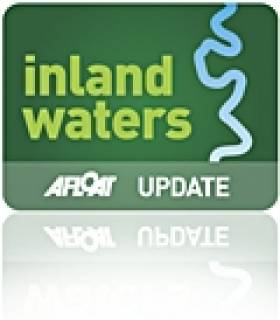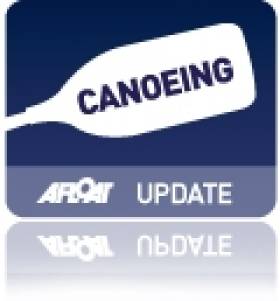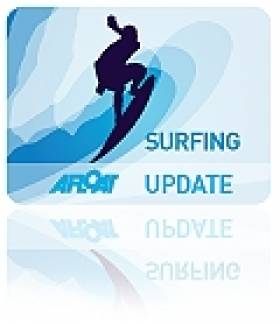Displaying items by tag: documentary
New Doco Tells Story of Royal Canal
A new documentary on Ireland's waterways is being filmed in Mullingar this week.
The series will follow naturalist and broadcaster Dick Warner as he explores the Royal Canal in time for the final reopening of the entire route.
Warner will be taking the Rambler, an original canal tug barsg, from Dublin through to Lough Ree for the first time since 1923.
Warner told the Westmeath Examiner that he's "enjoying the wildlife side of it the most, the kingfishers and herons, the wildflowers, that's what I've loved the most about this journey. We're making very good progress. We're in Ballymahon now and we hope to reach the Shannon by towards the end of this week."
Waterways - The Final Journey is set to come to our screens in August.
The Westmeath Examiner has more on the story HERE.
New Doco on Record-Breaking Kayak Voyage Round Ireland
As Elaine 'Shooter' Alexander continues her challenge to be the first woman to circumnavigate Ireland solo by kayak, news comes of a documetary on another recent kayak voyage.
British adventurers Jeff Allen and Harry Whelan recently completed their own circumnavigation of Ireland, breaking the previous record by eight days.
The duo's exploits were captured by filmmaker Vaughan Roberts for 'Into the Wind', which documents their epic 25-day voyage. A trailer for the new film can be seen here:
New TV Documentary: 'Smugglers'
The documentary also reveals the case of a 62-year-old retired taxi driver from Birmingham caught with 5kg of cocaine concealed behind the engine of his car.
Radio Documentaries on Irish Surfing
Two new radio documentaries on surfing in the west of Ireland are now available for all to listen online.
Originally broadcast on the Kilkee-based community station Raidió Corca Baiscinn at the end of last year, Conan Brophy's two-part series provides a snapshot of the surf scene in Co Clare, as well as the growing phenomenon of big wave surfing.
Both documentaries are available for listening HERE.
A Century of Sailing: Documentary Launch
A little fleet of boats based in Howth has sailed through three centuries to become the oldest one-design yachts in the world still racing. How did they do it? The answer is an "extraordinary love story" of passion, pride and dedication that is chronicled in "A Century of Sailing". This half-hour documentary follows the 112-year-old Howth 17 fleet through a season of challenges, including the revival of 100-year-old boat-building skills to expand the fleet for the first time in nearly a century. Filmed in high definition against a beautiful scenic backdrop, a DVD of this documentary will be launched with a special screening in Howth Yacht Club next Saturday.
Time: 4pm, Saturday, December 18
Location: Howth Yacht Club, Howth, Co. Dublin
Channel 4 to Broadcast Documentary on Britain's Round the Island Race'
'Spectacular', 'awe-inspiring' and 'exhilarating' are all words attributed to the J.P. Morgan Asset Management Round the Island Race and if you were one of the 16,000 sailors who took part this year, you will have the chance to re-live your race through a two-part Channel 4 documentary airing this month. A must-watch for all sports and sailing fans, Part 1 will air Saturday 13th November 2010, at 7.30am on Channel 4 and Part 2 goes out on Saturday 20th November 2010, at 7.30am on Channel 4.
The Race
Every year in June over 16,000 sailors, from Olympic gold medallists and world champions to family crews and those trying their hand at racing for the first time, compete in this unique yacht race around the Isle of Wight that is organised by the Island Sailing Club in Cowes. In most racing events the top prize usually goes to the first entry across the finish line; this is where the Round the Island Race differs. The coveted prize is the Gold Roman Bowl that is won by the crew with the best corrected time, worked out through a handicap system. This means big or small, all boats have the opportunity to win the grand prize.
Highs and lows
The two-part programme, produced by Sunset+Vine|APP in association with Channel 4, tells the story of four very different personalities, each with special reasons to compete in the 2010 race. The first part of the documentary takes the viewer into the day-to-day world of each of the four sailors, as they prepare for the fourth largest participation sporting event in the UK. The second part is filmed during the race itself with onboard cameras showing the highs and the lows as they compete against a fleet of some 1,700 boats.
The Cast
The first to feature is a professional multihull sailor, Loick Peyron. He is skippering the boat that crossed the finish line first in 2009. The team from OMAN SAIL are back to try and make it two in a row, racing one of the world's fastest sailboats. Can Loick repeat the team's success? The pressure is on!
The next character is Welsh surgeon Paul Rhys-Davies. Experience-wise he is a polar opposite to Loick. Paul is a newcomer to the world of sailing and hasn't even entered a race before! He is determined to finish his 50-nautical mile lap of the Isle of Wight with his rookie crew but their pre-race training doesn't go to plan and Paul is so nervous that he is unable to sleep the night before the race.
Having competed in the race numerous times, a man who understands the handicap system well is Cowes-based designer Jo Richards. For the 2010 edition he decided to design and build a small boat to race. He knew it would take much longer than most boats to finish the race, yet owing to its handicap rating, his boat named Moonshadow could still win the coveted Gold Roman Bowl. The story of Jo Richards begins with a race against time to complete the build of his boat, obtain a rating and make it to the start line.
The final competitor is competing not to win but to celebrate beating cancer. Dennise Shepherd is in recovery from breast cancer and has set herself the goal to complete the J.P Morgan Asset Management Round the Island Race to raise funds for Breast Cancer Care, the charity that supported her through her treatment. Dennise, from Chester, is used to sailing her tiny Mirror dinghy on a small lake, so competing in a fleet of over 1,700 yachts on open sea will be a massive and emotional learning curve.
Then tune in on the 13th and 20th November to see how they get on and enjoy this 'spectacular', 'awe-inspiring' and 'exhilarating' race from the comfort of your armchair.
Save the dates
Channel 4
Saturday, 13th November 2010 at 7.30am
&
Saturday, 20th November 2010 at 7.30am.



































































